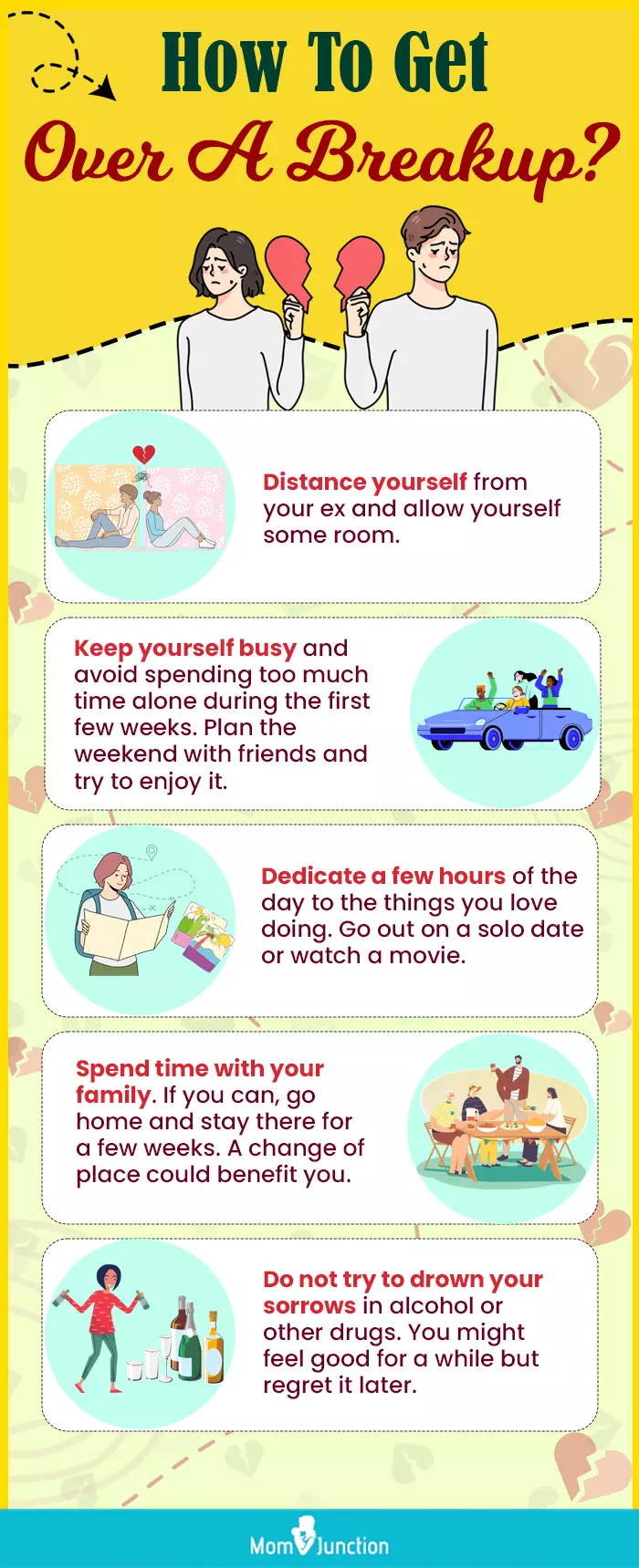

Image: Shutterstock
You have done everything to keep the connection. But still, the relationship fell apart and left you with sadness and despair. Breakup, especially when the relationship is long-term, can cause grief. In fact, you go through different stages of breakup.
There is no running away from the pain and hence you may find it hard to deal with feeling heartbroken. Grief is a typical reaction to loss. To help you with your journey, we bring you this post on stages of grief after a breakup and tips to overcome. Read on and analyze your feelings.
What Are The Seven Stages Of Grief After A Breakup?
Understanding the stages of grief after a breakup can help you become more self-aware and compassionate.
The phases might occur simultaneously or at different points. Your ability to prioritize meeting your objectives will bring positive results.
Image: Shutterstock
1. Shock
Shock may be the first painful thing you experience when you face a breakup. It often results from being unprepared or startled by suddenly losing someone you love. Your partner might have just sent an “it’s over” text or moved out without informing you. This may leave you numb as you cannot comprehend what happened.
Acknowledge that shock is a typical element of sorrow and that it may happen several times before the reality of the loss becomes clear. Losing your partner may be hard for you to process. Stop kicking yourself and give the feeling some time to pass at its own pace.
2. Denial
Denial could be the innate reaction to loss. Perhaps you assumed you would spend your entire life with this person and find it difficult to picture a life without them. You could be having difficulties accepting that your relationship is over. You are disappointed and want to figure out a way to reconcile. You’re in denial and still clinging to hope. It’s just too hard to confront, so you put off mourning. You briefly stop the grieving process by substituting the mourning phase with an overly optimistic belief that the relationship may still be saved.
You may feel confused or numb when in denial (1). You are hoping for something that doesn’t exist anymore, and this feeling may play with your mind. Remember to give yourself time to realize that you need to take steps forward instead of looking back at what already happened. Even though you may feel lonely, resist your urge to call or text your ex to come back to you.
 Quick tip
Quick tip3. Anger
Denial may eventually give way to rage. You may begin to feel powerless. You may even send your ex a message telling them you are devastated and distraught. Oftentimes, you may direct your anger toward trivial things. You may feel like taking out your anger on your close friends and loved ones. So you need to ensure your anger does not affect your relationship with your close people.
4. Bargaining
When you are mourning, you may eventually conclude that you may now have no control over anything. You may then start negotiating. You may feel forlorn and wish that you had a shot at doing things differently. The earlier circumstances and incidents keep coming back to your mind. This stage involves continually envisioning alternative outcomes and wondering what may have been said or done.
Just remember that thinking of all the things you could have done differently means you are putting all the burden on your shoulders as if you were the only one in the relationship.
5. Depression
You may start to lose interest in things as a whole and start becoming depressed. You may experience deep sadness, emptiness, and misery. A feeling of uselessness may also creep in. There is a possibility that your eating and sleeping schedules will be disturbed. You can begin to think there is no purpose to anything. Everything becomes gloomy and wretched. You may feel waves of sadness, despair, or hopelessness (1). It’s necessary to realize that this depression may not be an indication of a mental disorder. It is the fitting reaction after a significant loss.
Remember not to suppress the feelings of suffering and isolation . Identify them and let them pass. Let your friends and family know that you are going through depression. Talk to them and if you feel things are not getting better, seek help from a professional.
 Do remember
Do remember6. Acceptance
This could be an overwhelming feeling for you and also a difficult stage of grieving. You accept that the relationship is over and that there is nothing more you can do about it. Accepting the situation doesn’t have to mean that the pain and agony has disappeared. Grieving is a process, and it might take some time to start feeling okay again.
Accepting simply means you have finally realized what has happened and are in no mood to fix anything. You have probably started envisioning your life ahead without your ex.
7. Moving on
This is the stage of grieving where you finally start feeling free. Free of all the hurt that was holding you back. You don’t hate your ex or want any part of them in your life. Instead, you develop into an even better version of yourself with the lessons you gained from the situations.
Tracy Wong, a blogger, shares her breakup experience on her blog. She says, “The first 3 days were a living hell because I was crying intermittently whenever I was alone with my thoughts… My family and friends have been there for me always and I thank them for being my pillars of support… Deep down, I knew that the breakup was inevitable, although both of us have tried in our own ways to make things work. We were incompatible in terms of interests, values, and life goals… I knew I was in an extrovert-introvert relationship and have tried my best not to let our personality differences affect the relationship… What really drove us apart was our life goals. Even though I was devastated at the breakup, it was possibly the best solution for both of us. I hope to start my life anew and live my life more happily and fruitfully than ever before (i).’’
How To Get Over A Breakup?
You might need to get over a breakup quickly to avoid feeling any stages of grief that might make you mournful. But, it could be better if you give each stage some time and then let it all go eventually. There are no set breakup recovery stages. Here are a few tips that may help make the journey smoother.
 Quick tip
Quick tip1. Work on your self-confidence
It’s natural that you may begin to analyze your bodily features and character attributes, wondering what could possibly be lacking that one might fall out of love with you. This may make you feel rejected and desolate, but you must start thinking the other way. Instead of focusing on the traits you lack, focus on what you genuinely appreciate about yourself and how you did all you could in the relationship.
Image: Shutterstock
2. Visit new locales
Search for a cafe or restaurant you’ve never been to before. Try checking out new stuff around this once every week. It enables you to break free of your monotonous life and aid in your healing.
3. Refrain from pursuing a rebound
Rebounds give a fast lift that will briefly make you feel confident or valuable. But when the rush fades, you may feel dejected and end up regretting your actions.
4. Avoid making rash decisions
You wish to take severe action when the relationship fails but refrain from doing anything in a rush such as getting a drastic haircut or a permanent tattoo. You may regret these decisions taken based on resentment in the long run. It indicates that you are looking for a solution to stave off the unpleasant feelings associated with losing a person you care about. Recognize the pain and anguish, and try healthy ways to deal with it.
5. Get in touch with your loved ones
After a breakup
, you might need people by your side to help you move on. So, get in touch with your friends and family whom you couldn’t give enough time to when you were in a relationship. Spend quality time with them and make new memories.
Frequently Asked Questions
1. What is the hardest stage of grief to go through?
There is no hard or easy stage of grief after a breakup. Each individual experiences every stage in a different way and may feel helpless at times. So try to stay in touch with your friends and family while grieving and know when to ask for help.
2. How long does each stage of grief last?
There is no fixed period for grieving. One individual may go through the phases of mourning swiftly, while others may feel blue for a very long time and take months or even years to pass the phase.
3. Does everyone grieve after a breakup?
It cannot be said that everyone grieves the end of a relationship. You may not regret the decision if you get out of a toxic relationship or initiate a breakup for valid reasons.
Understand that grief doesn’t happen in a straight line. It could be difficult for you to process the withdrawal from a breakup. Also, there is no absolute order in which a stage of grief occurs. So you mustn’t bury your sadness. Feel it, and let it go. As the emotional stages of the breakup keep progressing, you’ll see everything in a new light and start envisioning a fresh beginning.
Infographic: Tips To Get Over A Breakup
Prioritizing yourself post-breakup is vital in your healing journey. There are many ways you can support yourself through this rough time. This infographic shares a few healthy ways to recover after a breakup. Try to analyze your feelings and follow the tips to move on in life without holding regrets. Illustration: Momjunction Design Team
Key Pointers
- Grief is a natural process after a breakup; you should not try to avoid it.
- Most people go through all the stages of grief after a considerable loss.
- You need to give time to each stage of grief and complete your healing.
- The grieving process may become difficult, but once you commit to healing, you’ll see the light at the end of the tunnel.
Illustration: Stages Of Grief After A Breakup & Tips To Get Over It
Image: Stable Diffusion/MomJunction Design Team
Feeling lost after a breakup? In this insightful video, learn the 7 stages of grief and how to cope with them from a breakup coach. Get the help you need to move on and find peace.
Personal Experience: Source
MomJunction articles include first-hand experiences to provide you with better insights through real-life narratives. Here are the sources of personal accounts referenced in this article.
i. When It’s Over: Moving On When a Relationship Ends.https://gilmangirl.livejournal.com/535108.html
References
- The Stages of Grief: Accepting the Unacceptable.
https://wellbeing.uw.edu/topic/mental-health/
Community Experiences
Join the conversation and become a part of our nurturing community! Share your stories, experiences, and insights to connect with fellow parents.
Read full bio of Amira Martin
Read full bio of Ipshita Chakraborty
Read full bio of Siddharth Kesiraju
Read full bio of Benidamika J Latam

























